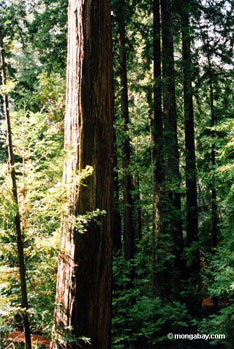U.S. could offset 20% of emissions through reforestation of marginal lands
U.S. could offset 20% of emissions through reforestation of marginal lands
mongabay.com
May 3, 2007
Reforesting marginal agricultural land could significantly slow the increase of carbon in the atmosphere reports a new study based on NASA data, though it would be no magic bullet in fighting global warming since temperate forests have been shown to increase regional temperatures by absorbing more sunlight. Still, reforestation has the potential to offer ancillary benefits including watershed services and erosion control.
Analyzing greenness’ data collected from the Advanced Very High Resolution Radiometer (AVHRR) sensor on the NOAA Polar Operational Environmental Satellite (POES), the researchers identified Texas, Minnesota, Iowa, Illinois and Missouri as the states with having the highest carbon storage potential by converting croplands to newly developed forests. The top five states with potential for converting rangelands or pastures were Texas, California, Montana, New Mexico and Colorado.
 |
Overall the researchers estimate that 20 percent of U.S. carbon emissions could be offset through afforestation, or the conversion of marginal agricultural lands into forests. Trees help mitigate carbon emissions by absorbing carbon dioxide into their tissues as they grow.
“In this study, we primarily wanted to know how much atmospheric carbon dioxide can be absorbed by plant growth over the next 20 to 30 years, if 25 percent or less of the Unites States croplands and rangelands was planted with native tree species,” said Christopher Potter, lead author of the paper in Climatic Change and a scientist from NASA Ames Research Center. “Our findings showed that at least one-fifth of annual fossil fuel emission of carbon in the United States can be offset by planting new forests.”
Globally the researchers estimate that up to 4.5 billion tons of carbon could be sequestered through such efforts.
Related articles
Temperate forests do not help fight global warming. Trees planted in temperate zones could worsen global warming according to research that will be presented on December 15 at the American Geophysical Society annual meeting in San Francisco. The study, which shows that trees planted in tropical regions can help fight climate change, found that global forests actually produce a net warming of the planet.
Changes in forest cover could affect climate as much as greenhouse gases in some areas. Deforestation, the growth of forests, and other changes in land cover could produce local temperature changes comparable to those caused by greenhouse gases according to new simulations from the National Center for Atmospheric Research (NCAR).